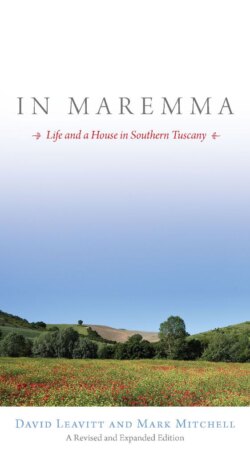Читать книгу In Maremma - David Leavitt - Страница 11
Оглавление5
MAGINI, THE CARPENTER, was a voluble Roman in his mid-seventies: proud of his work, and justly so, though rather bored after more than a half-century’s labor. For him, food was much more interesting than wood. He was the archetypal paterfamilias and really lived for those occasions when all of his family, unto its furthest ramifications, were gathered at his table. Whenever we saw him about the work he was doing for us—to calculate the proper height for the countertops, or to design a credenza for the kitchen, or to copy an eighteenth-century Venetian bookcase that had secret doors on the sides—it always happened to be just before or just after lunch. While he lacked the urbanity of Agatha Christie’s Hercule Poirot, he shared her Belgian detective’s attitude toward eating well. In Mrs. McGinty’s Dead, Poirot reflects, “I am not in tune with the modern world. And I am, in a superior way, a slave as other men are slaves. My work has enslaved me just as their work enslaves them. When the hour of leisure arrives, they have nothing with which to fill their leisure. The retired financier takes up golf, the little merchant puts his bulbs in his garden, me, I eat. But there it is, I come round to it again. One can only eat three times a day. And in between are the gaps.”
Magini’s shop was on the outskirts of Rome and, like every shop of this sort, had a girlie calendar on the wall. Close by was a canteen where we had lunch with him and Domenico once (September 2.3,1997). The subject of conversation was food. Domenico was saying that according to an article he had just read, fried squid had more cholesterol than practically anything else, even eggs. At that moment the waiter came up and announced that the piatti del giorno (day’s specials) were spaghetti alla carbonara and calamari fritti. No one ordered the fried squid but we all ordered the spaghetti, which was delicious and beautiful beyond words: pasta the color of a marigold, flecked with transparent confetti of pancetta, presented in a white bowl. “Please don’t tell Elizabeth I had this;” Domenico asked. “She’s on the cabbage soup diet.” The cabbage soup diet was in fashion that year. Emma, the younger of their two daughters, recently had remarked, “Mommy looks as if she is going to have a baby out of her bottom.”
If you’d had a look at Magini’s arteries, you would have been worried. He himself, however, lived as if there was no tomorrow In fact, he told us, the previous Sunday he and his wife had made tortellini a mano (by hand) for a small family lunch: seven hundred tortellini for ten people. Seventy tortellini per person. One thought of Blake’s proverb: “Enough—or too much.” One also thought that Magini’s indifference to his lipids and so on might not be so foolish after all. This was the year after an airplane en route to Paris had blown up over Long Island, killing every man, woman, and child aboard. How many of those souls had denied themselves eggs, or ice cream, or fried squid the day before they flew, believing that low cholesterol would assure them a longer life?
